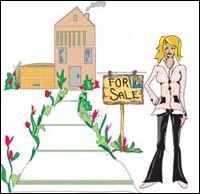 Real estate can be one of the best investments of your lifetime. Everyone knows it is most likely your home that will wind up being the best place to accrue value and profit at the end of a few decades.
Real estate can be one of the best investments of your lifetime. Everyone knows it is most likely your home that will wind up being the best place to accrue value and profit at the end of a few decades.
So it goes: Buy a home and sit back and relax and enjoy it, while you watch it appreciate in value. Then, when you reach retirement and the kids are all out of the house (hopefully never to return), you should be able to sell the home, downsize, and live off of the equity you’ve built up over the decades.
Not so fast. This is just no longer true. Here’s what’s been going on in the real estate world in the last few years in a simple explanatory form (which I need for myself, because it can get very complicated and confusing): if you have a mortgage on your home or condo that took quite a bit of effort to obtain because either your credit isn’t stellar or your income isn’t soaring, you might have gotten what is called a sub-prime mortgage. This means that a lending institution checked your credit and although it wasn’t commendable, they still felt you qualified to buy a home and they were willing to loan you the money to do so. (Again, I am grossly oversimplifying this; please understand. I’d rather you understand it broadly than try to give such details and background information, making your head spin off your shoulders yet still without grasping it.)
Now, perhaps you didn’t understand or figure int things when you purchased your home that the interest rate you got when you first borrowed the money was subject to change, meaning, bound to increase. And increase it did. Now, however, you and millions of other homeowners are in trouble, because as the interest rates went up, it forced your monthly mortgage payment up, too. In fact, up so high that perhaps it put you out of the ballpark for easily making your house payments. Remember, you were hard-pressed to get the loan in the first place, but the mortgage company liked you so they gave you the loan in spite of your credit appearance.
Month after month you struggled to make the payments, but eventually you fell behind. Your only hope to get out from those monthly payments and to not ruin your credit was to try to sell the house at a reduced price. But it wasn’t as easy as just selling, because there were so many homes on the market, allowing a buyer to be very selective and pick and choose from what’s out there. Perhaps, you started getting nasty letters from the bank or other mortgage institution where your loan was held. Before you knew it, your house was in foreclosure.
Now, this doesn’t only happen to you as a homeowner, although, of course, you feel the major brunt of the situation. You thought your home was going to be your nest egg to supplement your stock portfolio, an appreciating asset you were able to enjoy by living in it at the same time as it was increasing in value.
But now there’s a glut of re-sale homes on the market. This affects the new home construction business, because people now have the choice of a new home with all the work involved (lawns, landscaping, putting in a pool, etc.) or a home in which someone has already done the work, both inside and out. So the building of homes becomes a hurting business.
If people are losing their homes, they are certainly not running down to Home Depot to repair and renovate those houses. So retail starts to hurt in terms of businesses that have something to do with housing in any way, shape, or form. If people can’t make their mortgage payments, they are usually hurting in other financial ways and stop spending money in other retail arenas. This is one of the results of the sub-prime mortgage debacle: it has affected so many other areas as well.
Rents go up in apartments and rental units because people who have lost their homes need a place to live and are willing to pay higher rent to do so. The entire economy suffers in one way or another; it’s all tied together. And the ripples in one area can become tsunamis in another.
So what’s an investor to do? Well, first of all, if you are looking to buy a home for the first time, make sure you qualify for your loan easily and comfortably, and make sure you find out what would happen on a monthly payment basis if the interest rates went up on the loan. If you’re already in your home and if the payments aren’t too severe for you, count your blessings and look for other ways to invest for your future. This is not the time to sell a home unless you absolutely have to. Wait until the cycle is more in your favor, which it inevitably will be, perhaps in a year or two.
Be it ever so humble, there is no place like home. Make sure yours remains an asset and not a liability in your overall portfolio of investments.
